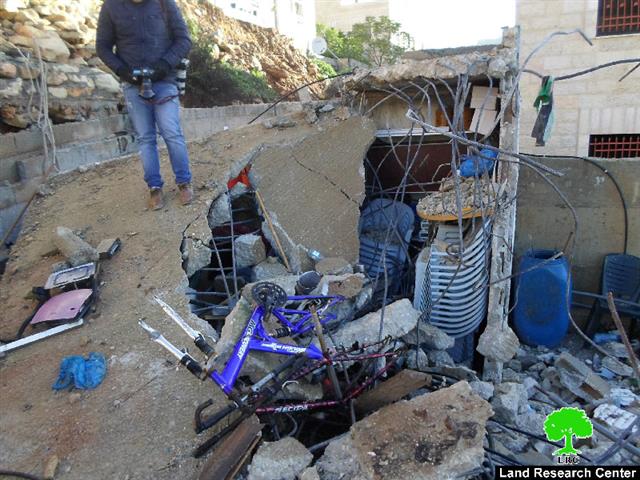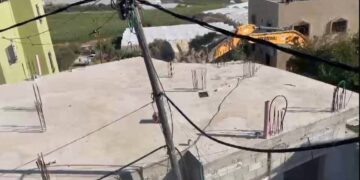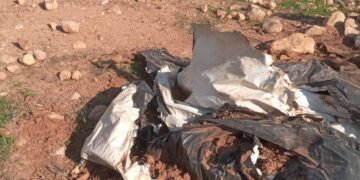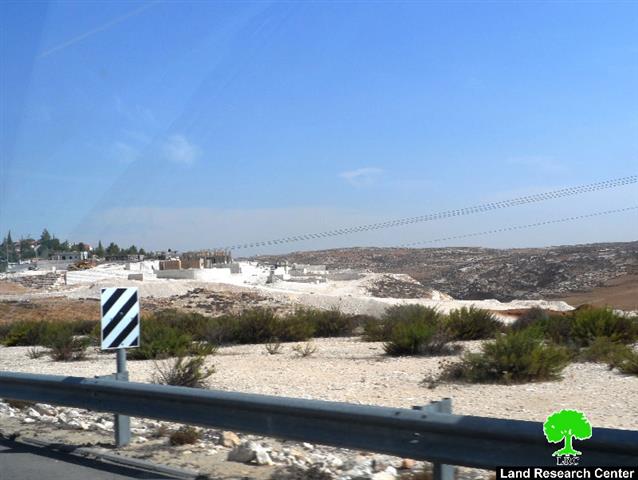- Violation: demolishing a martyr’s house
- Location: Sarda town- north Ramallah
- Date: January 09, 2016
- Perpetrators: the Israeli occupation forces
- Victims: the martyr’s family
Details:
The Israeli occupation army demolished on January 09, 2016 the house of martyr Muhannad al-Halabi in Sarda town, north of Ramallah city.
It should be marked that a large number of Israeli soldiers encircled and stormed the house of Halabi (19) before heavy demolition vehicles embarked on knocking it down. Noteworthy, AL-Halabi is law student at Al-Quds University and is allegedly accused of killing a colonists and injuring two others in a shooting attack in Jerusalem on October 03, 2015; he was shot dead in the attack.
It is reported that the occupation forces closed all roads leading to Halabi’s residence before they demolished the house. Power the communication grids of the nearby were reported damaged due to the demolition. The house is of 240m2 in area and was inhabited by the martyr’s seven member family including three minors.
views of the destruction that followed the demolition of Al-Halabi’s
It should be marked that the martyr’s family received a demolition two days after Muhannad was shot; the order was served as a collective punishment. The family submitted a plea to object to the demotion order through a human rights association but the objection was refused and Israel Supreme Court ruled in favor of demolishing the house on December 31, 2015. The affected family was given a ten day deadline to evacuate the house. As a result, the family had to rent a house to move in.
The policy of home demolition had a very negative impact on children’s and women’s psychology; especially when the process of demolishing is carried out in front of the affected.
Land Research Center LRC sees that demolitions contradict with all of the International conventions and Humanitarian laws including:
- Article 17 of the (1948) Universal Declaration of Human Rights stating: “Everyone has the right to own property alone as well as in association with others. No one shall be arbitrarily deprived of his property.”
- Section ‹G› of article 23 of the (1907) The Hague Conventions asserting: “In addition to the prohibitions provided by special Conventions, it is especially forbidden to destroy or seize the enemy's property, unless such destruction or seizure be imperatively demanded by the necessities of war.”
- Article 53 of the Geneva Fourth Convention (1948) declaring: “Any destruction by the Occupying Power of real or personal property belonging individually or collectively to private persons, or to the State, or to other public authorities, or to social or cooperative organizations, is prohibited, except where such destruction is rendered absolutely necessary by military operations.”
- Section 1, Article 11 of the International Covenant on Economic, Social and Cultural Rights (1966): “The States Parties to the present Covenant recognize the right of everyone to an adequate standard of living for himself and his family, including adequate food, clothing and housing, and to the continuous improvement of living conditions. The States Parties will take appropriate steps to ensure the realization of this right, recognizing to this effect the essential importance of international co-operation based on free consent."
Prepared by
The Land Research Center
LRC

















